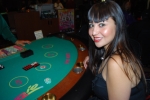Pai Gow Tiles - FAQ
I SAW YOUR ARTICLE "EXPLORING MICROGAMING" WHICH YOU SAID IT OFFERS THE PAI GOW DOMINO GAME. I WOULD BE VERY MUCH APPRECIATED IF YOU CAN TELL ME WHICH ONLINE CASINO OFFER THIS GAME. THANK YOU.
Three that I know have it are the Caribbean Gold, English Harbour, and Silver Dollar. Also, using all capital letters is rather obnoxious.
Great site! Is there any way I can download your pai gow practice program to preclude always having to play online? Thanks in advance.
Sorry, there isn't.
In Washington state some of the small non-Indian casinos offer "no-commission" pai-gow so you only lose equality on ’copies’. Without getting into the various house ways can you give some idea of how this improves the player odds?
The good news in Washington State is that there is no 5% commission, as you said. The bad news is that the dealer is always the banker, thus the player always loses on copies. Overall the house edge in the Washington game is 1.44%.
Thanks for teaching me Pai Gow Tiles. I had a most profitable time on my last Vegas trip. The question is that at many casinos the limit is $25. When winning, the house vig at some casinos is $1 on $25 bet equaling 4% not the 5% usually as they don’t have quarters. Does this affect the house’s edge if you do not vary the amount bet or stick to odd amounts bet?
You’re welcome. That was a difficult game to explain. The following table shows the house edge both ways, and the difference, assuming both player and dealer use the same house way.
House Edge in Pai Gow
| Event | 5% Comm. | 4% Comm. | Difference |
| Player | 0.023896 | 0.020811 | -0.003085 |
| Banker | 0.007377 | 0.004207 | -0.00317 |
I’m learning pai gow (tiles) for my next trip to Vegas. I would like to take advantage of the "banking" rules, but I have a couple of concerns, specifically banking and comps. If another player at the table shoves in a huge bet after I decide to bank, can I change my mind? Also, what happens if I don’t have enough chips to cover all the bets at the table?
Second, I hear that pai gow players are rated much lower than other table games per bet due to the slower pace of the game, true? Do you have an educated guess what the average bet in pai gow would have to be to equal the comp privileges of a $25/bet Blackjack player?
Your timing is good with this question. The summer of 2007 shall be referred to as my "summer of pai gow," because I am devoting a great deal of analysis to the game. About banking, yes, you can change your mind about banking, if a player makes a bet larger than you are comfortable with. It is a rule that you must have enough chips in front of you to cover all the action. My May 5, 2007 column shows that pai gow is rated at 30 hands per hour, at least by the casino that gave me the figures. If you multiply the assumed house edge and hands per hour in that table, you can see the blackjack is rated at 0.525 bet units per hour, and pai gow at 0.495, so blackjack is only slightly better at the same bet size. Although the expected loss is greater in pai gow, the standard deviation is much less. This makes pai gow a great game if you are playing for a rating, and wish to minimize risk.
What is the standard deviation for pai gow tiles?
0.75.
Your pai gow (tiles) strategies are optimized for the Foxwoods House Way, which was dated February 1997. In some of your strategies, there appears to be a player edge, or close to even odds. Do you know if any of the casinos in Vegas or elsewhere have read your website, and adjusted their house ways accordingly? Do you have any more updated information about house ways at different casinos? Also, on your odds table for pai gow, you have an "optimal" strategy, but it’s not clear to me where the rules for that strategy are. What is the "optimal" strategy? I’m really enjoying the game, and looking for ways to grind it out, have fun and get comps without losing too much money.
Caesars Palace here in Vegas changed their house way in the last few years. Previously, they never split up the gee joon pair, and now they do. A dealer at the Mandalay Bay recently commented to me about a rule change to play 0-7 over 3-4. About the reason behind the changes, I have no idea. I would be proud if I had something to do with it.
I recently added a house way for the Casino Canberra. In the future I may also add house ways for the Claridge in Atlantic City and Treasure Island in Las Vegas. It is tedious and time consuming to put them into HTML, which is why I have not done those yet.
My assistant JB is working on an optimal strategy against the Foxwoods house way. It should be up on the site shortly.
For pai gow and pai gow poker, is it true that there is no table limit on bets between players when a player is banking? What happens if a player, or group of players, bets more than the banker can cover?
To answer the second question first, the banker must have enough chips on the table to cover all bets. If he doesn’t, the dealer will give him the choice to buy more or forfeit his turn to bank.
As for the first question, the table limit still applies when a player is banking. It would seem to be good business to allow any bet, because the casino will stand to get 5% of a larger amount. I asked about this at three different casinos. The following is what I was told, in the order I asked:
Casino 1: The Gaming Control Board needs to approve increases in the maximum bet, which they can not do on short notice.
Casino 2: The Gaming Control Board has nothing to do with it. Instead, a casino vice president needs to authorize any increase in the maximum bet, and it is generally only done for known good customers.
Casino 3: Casinos don’t need Gaming Control Board approval to raise the maximum bet on a table. My source hadn’t heard of a casino allowing unlimited bets in the case of player banking and added, conceptually, there isn’t any exposure for the casino, so there wouldn’t be a reason to preclude it.
I would add that in my many hours of playing pai gow, I have never once seen anything close to this situation come up. Usually, players don’t like to bet against other players, and the maximums are sufficiently high that players rarely bump up against them, regardless of who is banking. However, if the situation happened often enough, I think casinos would indeed re-think their policy and allow unlimited bets.
This question was raised and discussed in the forum of my companion site Wizard of Vegas.
What is the probability of being dealt two pairs in pai gow?
Pai gow consists of 16 pairs of tiles. There are combin(16,2)=120 ways to choose 2 pairs out of 16. Once the two pairs are chosen, there is one way only to choose the specific tiles. There are combin(32,4)=35,960 ways to choose four tiles out 32. So the probability of two pairs is 120/35960 = 0.33%, or 1 in 300.
Not that you asked, but the probability of one pair is 16×combin(15,2)×22/combin(32,4)=18.69%.
 |  |
Pictures taken from my companion site Wizard of Vegas.
What is the proper etiquette for banking in pai gow or pai gow poker when other players are at the table?
The rules of etiquette are not firmly established, so I can only tell you my opinion. First, if you want to bank, then you are perfectly entitled to when it is your turn. Sometimes other players will moan about it, or blatantly complain about it in Chinese, but don’t let them make you feel ashamed to invoke your right to bank. Second, if another player is banking, and you want to bet, then you don’t have to ask anybody’s permission to.
However, if you want to go beyond the call of duty, it would be good to talk to the other player to ensure both of you are happy. If you ask to bank, then you risk a confrontation if the other player says he prefers that you don’t. Usually you can get an idea what he will say anyway. If you think he won’t object, then I would ask. If you wish to bet while another player is banking, it would be a nice thing to do if you didn’t bet more than he was comfortable with, while still betting enough to make it interesting for you. I think it is bad manners to over-bet, in an effort to cause a banking player to back down. This is something I’ve seen happen several times.
To summarize, if the other player you would be betting against looks like a reasonable person, then I would try to work out something mutually agreeable. If he seems like the "to hell with you" type, then I would just do whatever you want.
This question was raised and discussed in the forum of my companion site Wizard of Vegas.
What is the worst hand in Pai Gow?
The worst hand is the dreaded 1-2. It is composed of a high 6, low 6, low 4, and any 7. The probability of this hand is 2×2×2×4/combin(32,4) = 32/35,960 = 0.09%, or 1 in 1,124.

Interestingly, if the player played 0-3, the high hand would be a high-3, which is normally the minimum low hand the house way tries to achieve. I don’t know if that is a coincidence or not.
On average, what is the expected value of each tile in pai gow?
Good question. The following table shows the expected value of each by itself, in order of pair ranking. The table assumes the dealer is banking and optimal strategy.
Tile Expected Values
| Tile | EV |
| Gee | 0.123472 |
| 12 | 0.213725 |
| 2 | 0.188922 |
| H8 | 0.023017 |
| H4 | -0.075666 |
| H10 | -0.045843 |
| H6 | -0.129277 |
| L4 | -0.096778 |
| 11 | 0.004318 |
| L10 | -0.078575 |
| H7 | -0.104709 |
| L6 | -0.150023 |
| 9 | 0.033182 |
| L8 | -0.029015 |
| L7 | -0.110764 |
| 5 | -0.031472 |
The next table shows the same thing, but in expected value order.
Tile Expected Values
| Tile | EV |
| 12 | 0.213725 |
| 2 | 0.188922 |
| Gee | 0.123472 |
| 9 | 0.033182 |
| H8 | 0.023017 |
| 11 | 0.004318 |
| L8 | -0.029015 |
| 5 | -0.031472 |
| H10 | -0.045843 |
| H4 | -0.075666 |
| L10 | -0.078575 |
| L4 | -0.096778 |
| H7 | -0.104709 |
| L7 | -0.110764 |
| H6 | -0.129277 |
| L6 | -0.150023 |
The source of the expected values is my pai gow calculator 3.0. Just put in one tile and click the analyze button.
At the pai gow table, can I ask the dealer to review how I set my tiles to see if I did it the house way? How often is the house way the best way to play a hand?
As long as you are not slowing down the game, particularly when there are big bettors at the table, you can usually show how you would set your tiles and ask the dealer, "Is this how you would do it?" It will also depend on how patient the dealer is and/or whether the other players seem to object. One dealer I know didn't like to be asked because she said it confused her when she had to set her own hand. With any difficult game, if you're a beginner I would recommend trying to get a table to yourself the first time, so you don't inconvenience other players with a lot of questions.
Regarding the second question, if the player is going against the traditional house way, the house way will be correct 80.2% of the time. That other 19.8% is another reason why pai gow is such a difficult game to master.
This question was raised and discussed on my forum at Wizard of Vegas.
Did you see the Dilbert cartoon on Jan 23, 2012? Do you suppose Wally was playing pai gow (tiles) or pai gow poker?
Yes! I loved it. I think Wally was playing tiles. Here are my reasons:
- Wally looks like the kind of non-Asian player one would find at a tile table.
- Dilbert is the scientific type, who normally are sticklers for using correct terminology. Calling pai gow poker "pai gow" is incorrect and lazy. I know most people do so anyway, but I have higher expectations for Dilbert.
- In the second frame, Dilbert says that pai gow is "a difficult game to learn after a few adult beverages." Note that he said "learn," not "play." Pai gow poker is not that hard to learn. If you understand how to play poker, then pai gow poker can be easily explained in under a minute. Meanwhile, tiles is difficult to learn as well as play.
- The cartoon came out on Chinese New Year. This may have been an inside joke.
In the unlikely event Scott Adams should read this, I would welcome a definitive answer.
This question was discussed on my forum at Wizard of Vegas.




